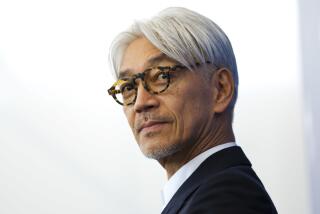Japanese Pay Homage, Ponder His Legacy : Hirohito’s Illness Touches Deep Chord
- Share via
TOKYO — They line up by the thousands every day, ignoring the endless autumn rain to pay homage to a man they understand mostly by instinct. As Emperor Hirohito lies on his deathbed, his subjects have come flocking to the palace gates to pray for his recovery and ponder the meaning of his legacy.
Japanese are demonstrating an outpouring of emotion that is extraordinary in the clockwork routine of this busy megalopolis. Spontaneity may have been helped along by exhaustive television news coverage, but for many of the hundreds of thousands of people who have visited the palace grounds since Hirohito began vomiting blood Sept. 19, the feelings are raw and real.
“I had to come here--my heart was bursting,” said Yoko Doma, a 30-year-old woman who boarded a train in Osaka for the three-hour ride to Tokyo. “I prayed that he’ll recover, even if for just one day, and I thanked him for all the sacrifices he’s made for the nation over the years.”
The object of visiting Fukiage Palace, the imperial residence in a lush green oasis in the center of Tokyo, is to sign slips of paper wishing health to Hirohito, who is reportedly dying of pancreatic cancer. The pilgrimage does not end with a signature, though.
People face the Sakashita Gate, clasp their hands and bow their heads in prayer; some fumble with their umbrellas as they get down on their knees. Strangers gather by the moat and sing “Kimigayo ,” the de facto national anthem. Its words implore the emperor to reign for a thousand years, “until what are now pebbles become mighty rocks covered with moss.”
Ruled for 62 Years
Hirohito, 87, has ruled for 62 years, the longest-reigning emperor since the Japanese began keeping history 1,400 years ago.
The emperor’s deteriorating health has created an atmosphere of melancholy and tense anticipation that overshadows most ordinary business. Government leaders are canceling trips, prices on the Tokyo stock market are gyrating on adverse news and local broadcasts of the Seoul Olympics are punctuated by medical reports detailing minuscule changes in the emperor’s temperature, pulse, blood pressure and respiration rate.
The suspense is heightened by the fact that the Imperial Household Agency has been less than forthcoming with substantive information during the crisis. The agency chided the news media for reporting that Hirohito has cancer, but it has not confirmed or denied the report.
The extent of the emperor’s internal hemorrhaging is of acute concern now that he has received a dozen transfusions replacing about two-thirds of his blood. Palace officials say the bleeding is minimal, but acknowledge that the emperor suffers from anemia and jaundice.
The emperor was coherent enough Tuesday to convey his appreciation to well-wishers. “I wish to thank them very much for worrying about my condition,” he said in a firm voice, according to palace spokesman Kenji Maeda.
What goes on in the minds of the Japanese praying outside the palace is an elusive matter. The pilgrims, many of whom took time off from work to come, typically had difficulty articulating their feelings about Hirohito, who must be regarded in a complex historical and cultural context. The emperor brings back bitter memories of World War II at the same time he embodies the virtues of perseverance that enabled Japan to rebuild from its ashes.
“There are some conscientious Japanese who see the emperor as having personal responsibility for the war,” said Shigeyoshi Murakami, a Keio University lecturer who specializes in the imperial system. “But it’s impossible for any criticism to come to the surface right now. All people can do is say they hope he gets better.”
As emperor, Hirohito is the supreme priest in the Shinto religion and was widely regarded as having divine qualities until he renounced them in 1946. Now he is a mere man, a warm but distant father figure whose imminent death evokes a visceral sense of loss.
“I feel as if we’ve lived through an era together,” said Masuo Tanaka, a Tokyo businessman who was a year old when Hirohito began his reign in 1926. “I’m overwhelmed by sadness.”
Surprisingly, many Japanese from the postwar generation have joined the throngs at the palace gate, suggesting that the emperor has a broader appeal than mere nostalgia.
More to Read
Sign up for Essential California
The most important California stories and recommendations in your inbox every morning.
You may occasionally receive promotional content from the Los Angeles Times.













